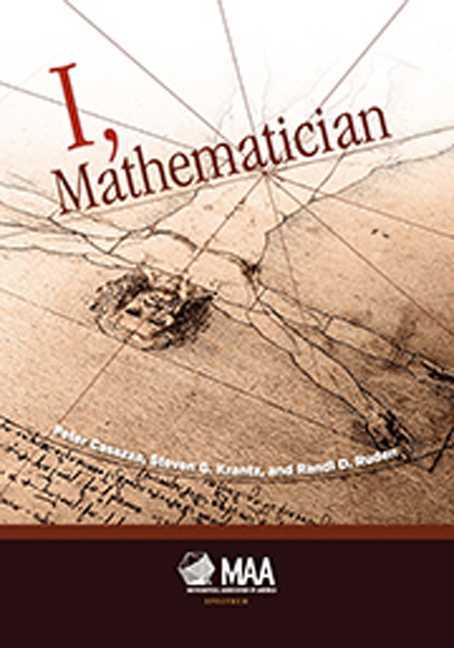Book contents
- Frontmatter
- Contents
- Preface
- Part 1 Who Are Mathematicians?
- Part II On Becoming a Mathematician
- Foreword to On Becoming a Mathematician
- 11 Mathematics and Teaching
- 12 Who We Are and How We Got That Way?
- 13 Social Class and Mathematical Values in the USA
- 14 The Badly Taught High School Calculus Lesson and the Mathematical Journey It Led Me To
- 15 The Psychology of Being a Mathematician
- 16 Dynamics of Mathematical Groups
- 17 Mathematics, Art, Civilization
- 18 Questions about Mathematics
- 19 A Woman Mathematician's Journey
- Part III Why I Became a Mathematician
15 - The Psychology of Being a Mathematician
from Part II - On Becoming a Mathematician
- Frontmatter
- Contents
- Preface
- Part 1 Who Are Mathematicians?
- Part II On Becoming a Mathematician
- Foreword to On Becoming a Mathematician
- 11 Mathematics and Teaching
- 12 Who We Are and How We Got That Way?
- 13 Social Class and Mathematical Values in the USA
- 14 The Badly Taught High School Calculus Lesson and the Mathematical Journey It Led Me To
- 15 The Psychology of Being a Mathematician
- 16 Dynamics of Mathematical Groups
- 17 Mathematics, Art, Civilization
- 18 Questions about Mathematics
- 19 A Woman Mathematician's Journey
- Part III Why I Became a Mathematician
Summary
I would like to refine the topic slightly. For the past thirty years I honestly don't think that I could in fairness call myself a mathematician. I am and have been a mathematics educator, certainly from the early 1980s on. The psychology is subtly different and I'd like to take the time here to talk about those differences. I will attempt to be as honest and frank as possible and to distinguish value judgments from fact or theory.
First, my father, Jack Garfunkel, was a mathematician. Some of you may know of his work in geometric inequalities. He even has one named for him. My dad was typical of a certain generation. He was the top mathematics student at City College in 1930 and won the Belden Prize there. He longed to go on for his Ph.D., but it was 1930 after all and he wound up working in his father's grocery store on the lower east side of Manhattan. The grocery business led to the candy business in which he had a rags to riches (in 1947 he had the exclusive rights to Walt Disney chocolate molds) to rags ride up until 1960, when he took an emergency exam to become a high school mathematics teacher.
I have a number of his candy cookbooks, ones in which there are recipes for marshmallow and jellies where the ingredients are measured in bushels and barrels. And, in the margin of those books, are twenty-page proofs of Morley's theorem using trigonometric identities and inequalities. The point is he did mathematics every day of his life, despite the fact that his formal learning of the subject ended in his senior year in college. His Erdős number is one lower than mine and he was a regular and prolific contributor to Crux Mathematicorum and to the problem sections of the American Mathematical Monthly.
My father wanted me to become a mathematician and college professor. The words themselves cannot begin to express how strongly he wanted these things. He loved mathematics and he wanted me to love it as well. He had lived through the ups and downs of the business cycle and he wanted me to be spared its vicissitudes and uncertainties. He saw the life of a research mathematician as an ideal—his ideal—and he wanted that life for me.
- Type
- Chapter
- Information
- I, Mathematician , pp. 183 - 191Publisher: Mathematical Association of AmericaPrint publication year: 2015

